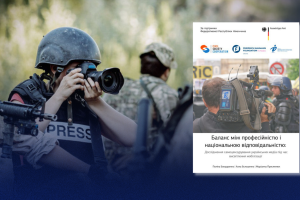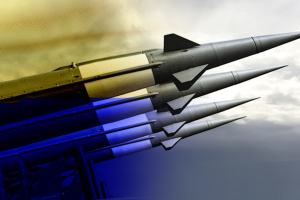This nationwide public opinion survey was conducted jointly by the Ilko Democratic Initiatives Foundation with the Kyiv International Institute of Sociology on August 16-28, 2018 in all regions of Ukraine, excluding the Russian occupied Ukrainian territory of Crimea and occupied territories of Donetsk and Luhansk oblasts. 2,041 respondents, aged 18 years and older, were polled. The sample error doesn’t exceed 2.3%. The statistical sampling error (with a probability of 0.95 and a design effect of 1.5) doesn’t exceed 3.3% for indicators close to 50%, 2.8% for indicators close to 25 or 75%, 2.0% for indicators close to12 or 88%, 1.4% for indicators close to 5 or 95%, 0.7% for indicators close to 1 or 99%.
An absolute majority of Ukrainian citizens (83%) believes that Ukraine faces serious threats: 62% rate them as realistic and another 21% as likely.
Ukrainians perceive the biggest threats in the economic field: economic decline and a serious economic crisis (58%), widespread poverty and significant property stratification (41,5%), and depreciation of the national currency – hryvnia (36%).
Respondents from all regions understand urgency of the biggest threats. However, the two threats, namely takeover of Ukraine or part of Ukrainian territory by Russia (31%) and the breakup of Ukraine or secession of certain territories (28%) are assessed differently in different regions of the country. Russia is considered a serious threat in the West (42%) and Center (37%), while in the South (22%) and the East (8%) it is not considered as formidable. At the same time, people in the East see the biggest threat in disintegration of Ukraine or secession – 42%. In the South economic troubles are perceived as the most serious threats.
In the opinion of Ukrainians, the biggest problem that impedes country’s development is corruption – such statement is supported by 79% of the respondents. It is worth mentioning that the war in Donbas was considered as a major problem by fewer respondents (55%). Among the other issues that are negatively influencing the country people mention the dominance of oligarchs in the economy (32%) and the absence of professionals in government (30%).
A prevailing majority of respondents (72%) believes that Ukraine at present is under significant foreign influence. Furthermore, some respondents (26%) are convinced that this influence is decisive. And only 3% believes that foreign influence is not present in Ukraine, while 14% says that such influence is negligible.
The survey found that among the most influential foreign actors are the United States of America (54%) and the European Union (46%). Additionally, a lot of people believe the most influential actors are Russia (39%) and the IMF (29%).
Perception of US as the powerful source of influence is concentrated in the East (70%) and south (60%) of the country, while in the west such opinion is significantly lower (40%). Perception of Russia as decisive influencing power is shared rather in the western and central regions (40-45% mentions) than in the southern and eastern regions (33-34%).
Majority of respondents (55%) perceives the EU’s influence on Ukraine as positive, while 29% says this influence is negative. The largest shares of people who positively perceive European influence are located in the western (78%) and central (51%) regions. However, in the eastern regions the proportions of the positive and negative attitudes toward EU are approximately even (42% and 41%), while the southern regions people are more inclined towards a negative view about EU (48% versus 30% with positive perception).
Overall, positive assessment of U.S. influence over Ukraine is stronger than negative (44% versus 36%). However, there are visible regional differences in these attitudes: favorable assessments of American influence are shared by 68% residents in the west, 48% – in the center, 27% – in the east, and 23% – in the south.
Russian influence is characterized by a vast majority of respondents (75%) as negative, and only 8% perceived it as beneficial for Ukraine. Substantial dissatisfaction with Russian influence is found in all regions. However, the most concerned are residents of the west (93%) and center (79% of negative assessments), while in the east and south negative attitude is demonstrated by 56% and 58%, respectively.
Attitudes towards the IMF’s impact are rather negative; particularly, 53% of polled deemed such assessments as influential, whereas only 24% say they are positive. Negative assessments prevail over positive ones in almost all regions. Moreover, the most negative perception of the IMF is demonstrated by residents of the south (75%) and east (72%), whereas in the center, the corresponding indicator stands at 50%. And only in the western region positive assessments prevail over negative ones (respectively, 37% versus 29%).
Perceptions of the influence on our country that international organizations have (such as, the U.N., OSCE, and Council of Europe) are rather positive. In particular, 42% of those surveyed gave such positive assessments, whereas 23% of respondents rated them as negative. At the same time more than a third of those polled (35%) cannot decide on this issue, which may indicate that Ukrainians are poorly informed about the activities of these organizations. Positive assessments of the activities of international organizations prevail over negative in almost all regions, excluding the south. The best balance between positive and negative assessments is found in the west (47% and 16%, respectively) and in the center (48% and 18%, respectively), and a somewhat worse balance is in the east (38% and 24%). But in the south, negative assessments prevail (here 30% of those polled gave positive assessments, and 37% negative ones).
The nature of impact of the international business organizations on Ukraine was not identified by 46% of those polled, and roughly the same share of respondents among those remaining gave similarly equal positive and negative assessments.








